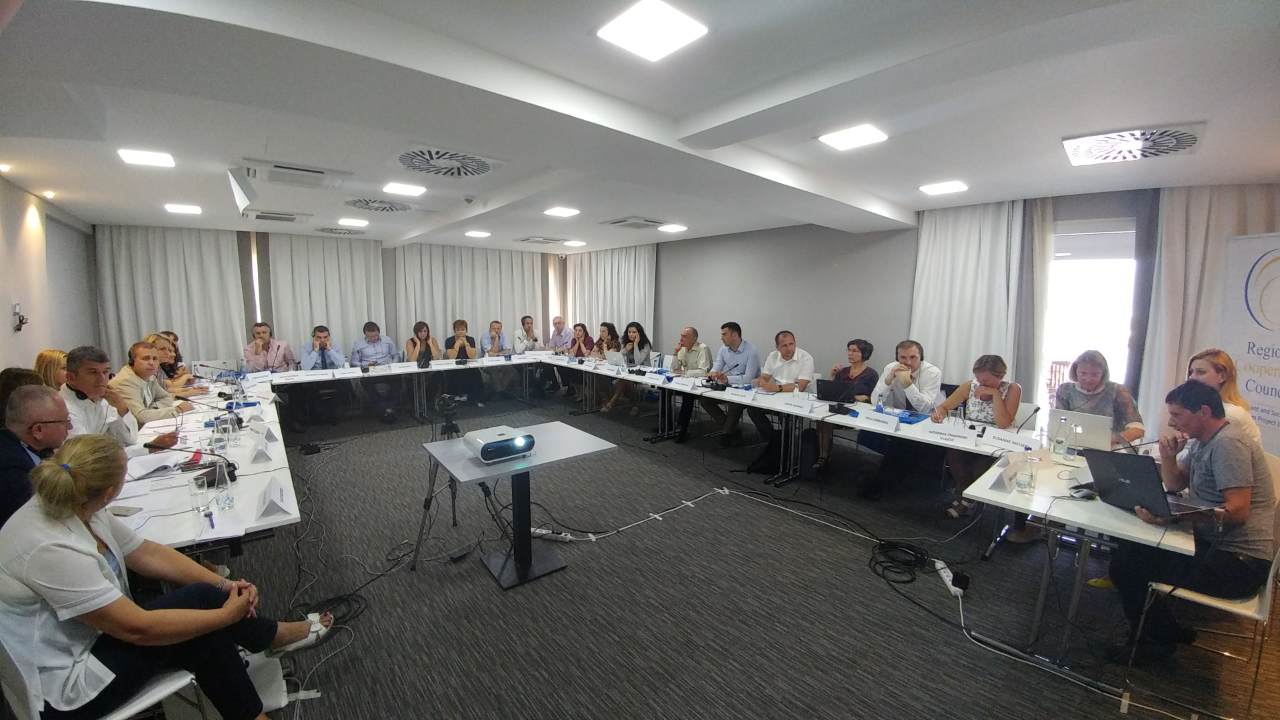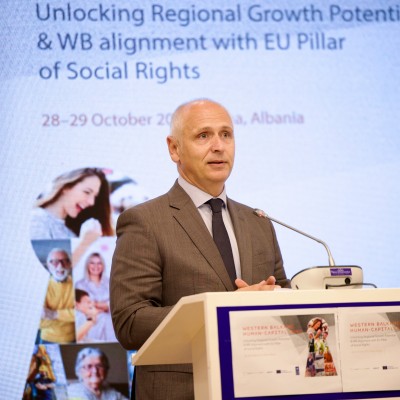Representatives of Western Balkan Public Employment Services discuss qualitative benchmarking
18 July 2017

Meeting of representatives of Western Balkan Public Employment Services on qualitative benchmarking, Tivat, Montenegro, 18 July 2017 (Photo: RCC/ESAP/Sanda Topic)
Tivat - Representatives of Western Balkan Public Employment Services (PES) met in Tivat today to discuss qualitative benchmarking, in the framework of the Regional Cooperation Council’s (RCC) Employment and Social Affairs Platform (ESAP) regional project.
The aim of the meeting was to present the preliminary analysis of quantitative indicators, discuss the details and milestones of the qualitative benchmarking methodology implementation, including questionnaires and templates for the self- and external assessments, and agree on the timetable for the external peer review visits.
Vanja Ivosevic, Senior RCC expert on Skills and Mobility welcomed the participants on behalf of the RCC, reiterating that the benchlearning exercise, designed to help PES from Western Balkans aligning their operations and practices with the EU PES, is a needed requirement on the region’s EU accession path.
Suljo Mustafic, Director of Employment Agency of Montenegro thanked the RCC, International Labour organization (ILO) and the EU for the ESAP project as it can help in reaching their objective to regulate labour markets and help create employment but also provides new learning opportunities.
Susanne M. Nielsen, ILO Team Leader and Chief technical advisor for ESAP, highlighted importance of the joint work with the RCC to establish this virtual platform, bringing organisation’s relevant knowledge and experience from all around the world to the table.
Drawing on the European Union’s (EU) PES experience, ‘benchlearning’ refers to the process of creating a systematic and integrated link between benchmarking and mutual learning activities that consists of identifying good performances through indicator-based benchmarking systems and of using findings for tangible and evidence-informed mutual learning activities.
Based on the RCC-commissioned study on current performance management practices of the Western Balkan PES and a proposed methodology for the implementation of benchlearning, the participants learned about the proposed quantitative benchmarking indicators as well as methodological aspects of indicator definitions, data collection, and validation procedures.
“The ESAP Project has already started officially communicating to each national employment service the preliminarily agreed indicators (for 2016 only) for official review and concurrence. These are:
• Transition from unemployment into employment;
• Number of people leaving the PES unemployment records, as a share of the stock of registered unemployed individuals;
• Composition of the unemployment register (by individual characteristics and geographical distribution);
• Inflow and outflow; and
• Participants to active labour market programmes”, said Nand Shani, Team leader of ESAP project.
The RCC expert team for benchmarking presented the detailed materials and activities to be implemented in the benchmarking exercise to the participants. This included an overview of the 29 PES performance enablers along the 7 areas of qualitative performance benchmarking and a step-by-step approach to the implementation of the initiative.
Areas of benchmarking through qualitative internal and external assessment of performance enablers would include: Strategic performance management; Design of operational processes such as effective channeling and profiling of jobseekers and tailored use of active labour market instruments; Sustainable activation and management of transitions; Relations to employers; Evidence-based design and implementation of PES services; Effective management of partnerships with stakeholders; and Allocation of PES resources.
Participants of the event, organised by RCC’s ESAP Project, were high level officials of PES from the Western Balkan economies.
‘Employment and Social Affairs Platform’ (ESAP) has started in March 2016 and will last for 3 years. It is a regional project financed by the European Commission and jointly implemented by RCC and ILO (International Labour Organisation) in the Western Balkan economies. The project aims to strengthen regional cooperation and institutional capacities of national administrations, employers’ and workers’ organisations, enabling them to develop and effectively implement labour market and social policy reforms in their EU accession process.



